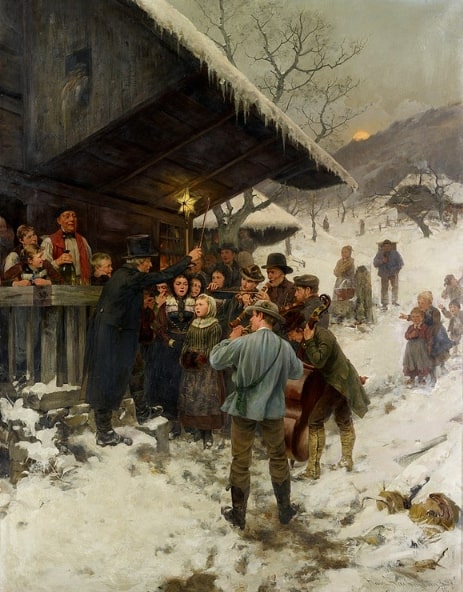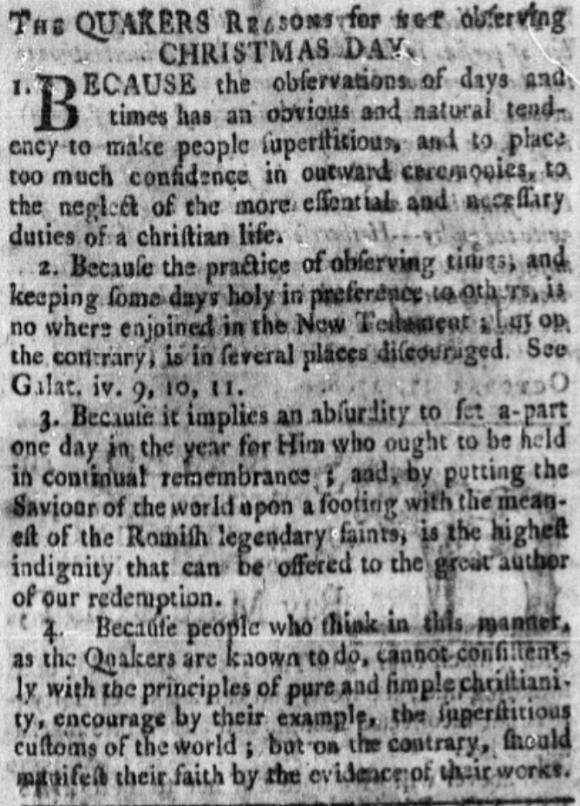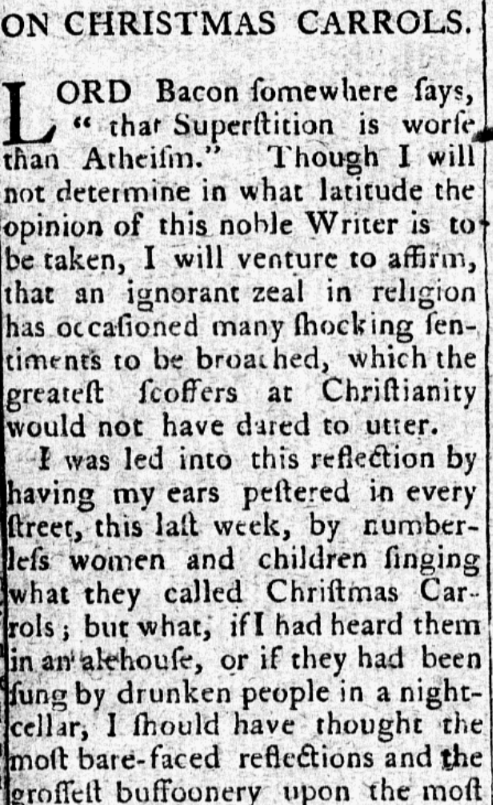Introduction: In this article, Katie Rebecca Garner writes about how some of our ancestors c. 1800 were opposed to Christmas celebrations. Katie specializes in U.S. research for family history, enjoys writing and researching, and is developing curricula for teaching children genealogy.
Some of our Christmas traditions have ancient pagan origins. The pagan winter celebrations included reveling, wild partying, and illegal activities. Even as Christianity grew, the early Christians opted to participate in these parties rather than in worship services set to commemorate Christ’s birth. These partygoers often opted to repent after the parties.

Reveling as a way to celebrate Christ’s birth continued into medieval times. Because the authorities would not take action, those who chose to celebrate with illegal activities got away with it. This continued until the Reformation. (1)
Several Protestant religions sprang up during the Reformation, many of which were against celebrating Christmas. This included Baptists, Congregationalists, Puritans, Presbyterians, and Quakers. (2) Is it any wonder that some religious groups were against Christmas celebrations, considering the irreverent reveling that was popular?
In the late 18th century, a Quaker author published a piece in the newspaper explaining why Quakers did not celebrate Christmas. This author argued that the New Testament does not say anything to encourage making some days holy preferable to others – he even quoted Bible verses discouraging that practice.
The author further argued that it’s absurd to set aside one day a year “for Him who ought to be held in continual remembrance.” His final argument was that Quakers should manifest their faith by their works rather than encouraging the superstitious customs of the world.

Of his four points for why Quakers should not observe Christmas Day, his tone is most sharply reflected in his third point:
Because it implies an absurdity to set apart one day in the year for Him who ought to be held in continual remembrance; and, by putting the Saviour of the world upon a footing with the meanest of the Romish legendary saints, is the highest indignity that can be offered to the great author of our redemption.
With the decline in Christmas celebrations came a decrease in Christmas carols. The first Christmas carols had been written by early Christian clergy. Writing and singing Christmas carols became especially popular in medieval times and during the Renaissance. With the emergence of religions rejecting Christmas, Christmas carols declined for a few centuries. (3)
A contemporary of that time published a complaint against Christmas caroling in 1788. The author described people in the street singing Christmas carols, including women and children, and described a mother with young children strapped to her back. He compared their singing to the drunken singing in an alehouse. The fact that people were out singing suggests that some were still into caroling. The author then quoted the lyrics of a song that one caroler sang and complained about the absurdity of the song’s portrayal of the Christ child “for the sake of rhyme.”

The author of this article accosted one woman singing carols in the street, and wrote:
The following stanza, the first of her carols, filled me with particular indignation:
The first good joy our Mary had,
It was the joy of one –
To see her own Son Jesus
To suck at her breast-bone, &c., &c.The absurdity of making the Holy Infant suck at the breast-bone for the sake of the rhyme, can be only equalled by a Dutch picture which I saw when I was in Holland…
After reading that article from 1788, I can’t help but wonder what this author would think of the Christmas songs popular in the 21st century, especially the favorites about Santa Claus or Rudolf the red-nosed reindeer, which don’t mention the Christ child at all. Or what would he think of the songs associated with Christmas that don’t mention Christmas at all but focus on romanticizing snowy winters? (I have told my friends such songs would be appropriate for Valentine’s Day.)
Christmas became popular again in the Victorian era, and many familiar Christmas traditions emerged then. Of your ancestors who lived between the Reformation and the resurgence of Christmas, were yours among those who celebrated or rejected Christmas?
Explore over 330 years of newspapers and historical records in GenealogyBank. Discover your family story! Start a 7-Day Free Trial
Note on the header image: Christmas at the Annunciation Church in Nazareth, 1965. Credit: Israel Press and Photo Agency (I.P.P.A.) / Dan Hadani collection, National Library of Israel / CC BY 4.0; Wikimedia Commons.
____________________
(1) Collins, A. (2003). Stories behind the great traditions of Christmas. Zondervan.
(2) Gulevich, T., & Stavros-Lanning, M. A. (2000). America, Christmas in Colonial. In Encyclopedia of Christmas: Nearly 200 alphabetically arranged entries covering all aspects of Christmas, including folk customs, religious observances, history, legends, symbols, and related days from Europe, America, and around the world. essay, Omnigraphics.
(3) Omnigraphics. (2000). Christmas Carol. In Encyclopedia of Christmas: Nearly 200 alphabetically arranged entries covering all aspects of Christmas, including folk customs, religious observances, history, legends, symbols, and related days from Europe, America, and around the world: Supplemented by a bibliography, and lists of Christmas websites and associations, as well as an index. essay.
